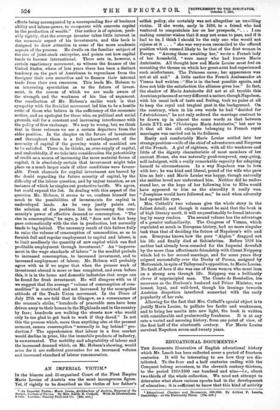AN IMPERIAL VICTIM.* IN the bizarre and ill-organized Court of
the First Empire Marie Louise of Austria was the most incongruous figure. Yet, if rightly to be described as the victim of her father's
• An Imperial Victim: Marie Louise, Archduchess of Austria. Empress of the French, Dachau of Parma. By Mrs. Edith E. Cuthell. With 34 Illustrations. 2 vole. London: Stanley rani and Co. [24e. net.]
selfish policy, she certainly was not altogether an unwilling victim. If she wrote, early in 1810, to a friend who had ventured to congratulate her on her prospects, " . . I am making counter-wishes that it may not come to pass, and if it had to be. I think I should be the only one who would not rejoice at it . . . " she was very soon reconciled to the offered position which seemed likely to be that of the first woman in Europe. "Among those awaiting her," wrote a French lady of her household, " were many who had known Marie Antoinette. All thought how sad Marie Louise must feel on mounting the throne on which her great-aunt had experienced such misfortunes. The Princess came; her appearance was not at all sad." A little earlier the French Ambassador at Vienna had written : "She is in the best possible spirits, and does not hide the satisfaction the alliance gives her." In fact, the shadow of Marie Antoinette did not at all trouble this Austrian princess of so very different a nature, though Napoleon, with his usual lack of taste and feeling, took no pains at all to keep the royal and tragical past in the background. On the contrary, when in his own words he had "decided for l'Autrichienne," he not only ordered the marriage contract to be drawn up in almost the same words as that between Louis XVI. and "l'historique Marie Antoinette," but saw to it that all the old etiquette belonging to French royal marriages was carried out in its fullness.
Easily and comfortably Marie Louise settled into her strange position—wife of the chief of adventurers and Empress of the French. A girl of eighteen, with all the weakness and little of the dignity characteristic of most members of her ancient House, she was naturally good-tempered, easy-going, self-indulgent, with a really remarkable capacity for adapting herself to circumstances. In a way Napoleon was in lova with her ; he was kind and liberal, proud of the wife who gave him an heir : and Marie Louise was happy, though naturally she neither loved nor understood him. Neither did be under. stand her, or the hope of her following him to Elba would have appeared to him as the absurdity it really was. " Josephine would have followed me," he said when adversity had opened his eyes.
Mrs. Cuthell's two volumes give the whole story in the fullest detail; and though it cannot be said that the book is of high literary merit, it will unquestionably be found interest- ing by many readers. The second volume has the advantage of a greater unfamiliarity. The Congress of Vienna, which regulated so much in European history, had no more singular task than that of deciding the future of Napoleon's wife and son. Everyone knows how the poor " Aiglon " dragged out his life and finally died at SchiMbriinn. Before 1816 his mother had already been consoled for the Imperial downfall by the more than affectionate friendship with Count Neipperg which led to her second marriage, and for some years they reigned successfully over the Duchy of Parma, assigned by Metternich, in spite of Talleyrand's opposition, to Marie Louise. No fault of hers if she was one of those women who must lean on a strong arm through life. Neipperg was a brilliantly clever if unprincipled man. The Comte de Bombelles, his successor as the Duchess's husband and Prime Minister, was honest, loyal, and well-bred, though his leanings towards Austrian despotism interfered somewhat with the early popularity of her rule.
Allowing for the fact that Mrs. Cuthell's special object is to justify Marie Louise, to palliate her faults and weaknesses, and to bring her merits into new light, the book is written with considerable and praiseworthy frankness. It is at any rate a varied and amusing history, from one point of view, of the first half of the nineteenth century. For Marie Louise survived Napoleon seven-and-twenty years.






























































 Previous page
Previous page